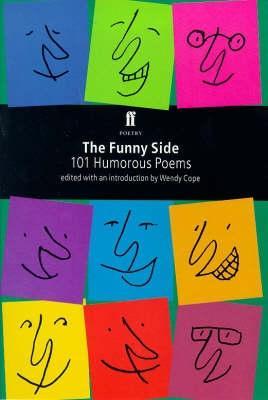
Wendy Cope dislikes the term “light verse” because she feels it implies the included poetry can never be serious. Presumably she doesn’t take the matter lightly, given that she is considered (or dismissed as) a brilliant (but) light verse poet, with works such as Making Cocoa for Kingsley Amis to her credit. Flippant is fine with her, but that shouldn’t be the be-all and end-all of “humorous” poems. Her choices for this anthology range from the frivolous to the suicidal; light or dark in subject, they are all amusing in their expression.
The poems are strung together in unobtrusive clumps of themes. The anthology kicks off with Richard Armour’s Money:
That money talks
I won’t deny.
I heard it once,
It said goodbye.
followed by Hilaire Belloc’s Fatigue:
I’m tired of Love: I’m still more tired of Rhyme.
But Money gives me pleasure all the time.
And so you leap in – you’ve just read the first two pages of the book. But in case you think that all the pieces are going to be so short, the next is the anonymous Strike among the Poets:
In his chamber, weak and dying,
While the Norman baron lay,
Loud, without, his men were crying
‘Shorter hours and better pay.’
and so on for seven stanzas of young Lochinvar and the boy on the burning deck and other worthies all demanding shorter hours and better pay.
Segue to the next poem, Harry Graham’s two full pages of Poetical Economy:, this being an example:
When I’ve a syllable de trop,
I cut it off without apol.:
This verbal sacrifice, I know,
May irritate the schol.;
But all must praise my dev’lish cunn.
Who realize that Time is Mon.
Most of the poems will be known to aficionados of, yes, light verse – the older pieces by Thomas Hood and Lewis Carroll and so on are relatively well known. But I found several delightful surprises: the excerpts from D. J. Enright’s Paradise Illustrated: A Sequence:
‘Why didn’t we think of clothes before?’
Asked Adam,
Removing Eve’s.
‘Why did we ever think of clothes?’
Asked Eve,
Laundering Adam’s.
Kit Wright’s (lengthy) The Orbison Consolations:
Only the lonely
Know the way you feel tonight?
Surely the poorly
Have some insight?
Oddly, the godly
Also might,
And slowly the lowly
Will learn to read you right.
And then there’s Edwin Morgan’s The Mummy, on the arrival of Ramses II at Orly airport in 1976… but that one’s too complicated for this post. You’ll have to find it yourself.
It seems that Faber put out other books in this series in the late 1990s: By Heart – 101 Poems to Remember, edited by Ted Hughes, and Sounds Good – 101 Poems to be Heard, edited by Christopher Reid. I need to get them as well.

